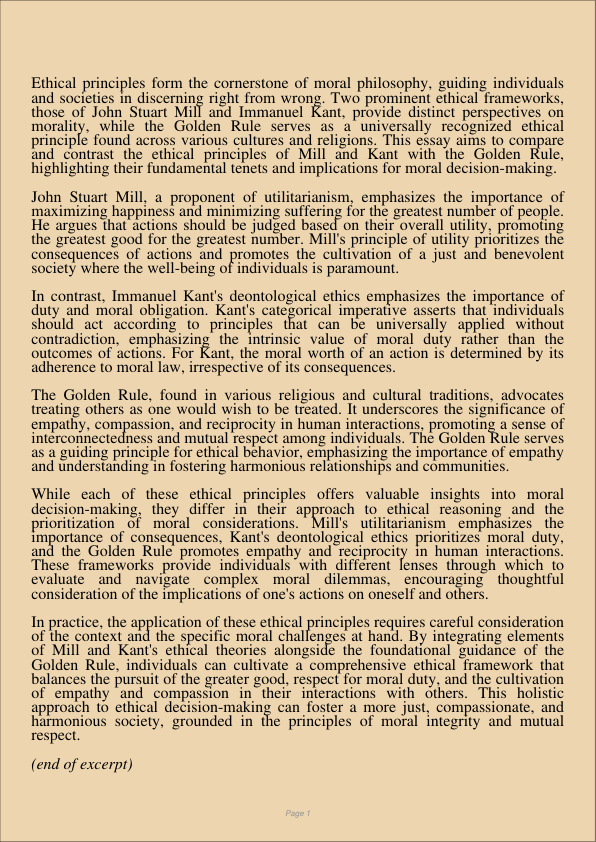Ethical Principles In Philosophy Mill And Kant Vs The Golden Rule
Dec 31, 2023
kant vs
golden rule
Gender & Sexual Studies
Business

Ethical principles form the cornerstone of moral philosophy, guiding individuals and societies in discerning right from wrong. Two prominent ethical frameworks, those of John Stuart Mill and Immanuel Kant, provide distinct perspectives on morality, while the Golden Rule serves as a universally recognized ethical principle found across various cultures and religions. This essay aims to compare and contrast the ethical principles of Mill and Kant with the Golden Rule, highlighting their fundamental tenets and implications for moral decision-making.
John Stuart Mill, a proponent of utilitarianism, emphasizes the importance of maximizing happiness and minimizing suffering for the greatest number of people. He argues that actions should be judged based on their overall utility, promoting the greatest good for the greatest number. Mill’s principle of utility prioritizes the consequences of actions and promotes the cultivation of a just and benevolent society where the well-being of individuals is paramount.
In contrast, Immanuel Kant’s deontological ethics emphasizes the importance of duty and moral obligation. Kant’s categorical imperative asserts that individuals should act according to principles that can be universally applied without contradiction, emphasizing the intrinsic value of moral duty rather than the outcomes of actions. For Kant, the moral worth of an action is determined by its adherence to moral law, irrespective of its consequences.
The Golden Rule, found in various religious and cultural traditions, advocates treating others as one would wish to be treated. It underscores the significance of empathy, compassion, and reciprocity in human interactions, promoting a sense of interconnectedness and mutual respect among individuals. The Golden Rule serves as a guiding principle for ethical behavior, emphasizing the importance of empathy and understanding in fostering harmonious relationships and communities.
While each of these ethical principles offers valuable insights into moral decision-making, they differ in their approach to ethical reasoning and the prioritization of moral considerations. Mill’s utilitarianism emphasizes the importance of consequences, Kant’s deontological ethics prioritizes moral duty, and the Golden Rule promotes empathy and reciprocity in human interactions. These frameworks provide individuals with different lenses through which to evaluate and navigate complex moral dilemmas, encouraging thoughtful consideration of the implications of one’s actions on oneself and others.
In practice, the application of these ethical principles requires careful consideration of the context and the specific moral challenges at hand. By integrating elements of Mill and Kant’s ethical theories alongside the foundational guidance of the Golden Rule, individuals can cultivate a comprehensive ethical framework that balances the pursuit of the greater good, respect for moral duty, and the cultivation of empathy and compassion in their interactions with others. This holistic approach to ethical decision-making can foster a more just, compassionate, and harmonious society, grounded in the principles of moral integrity and mutual respect.